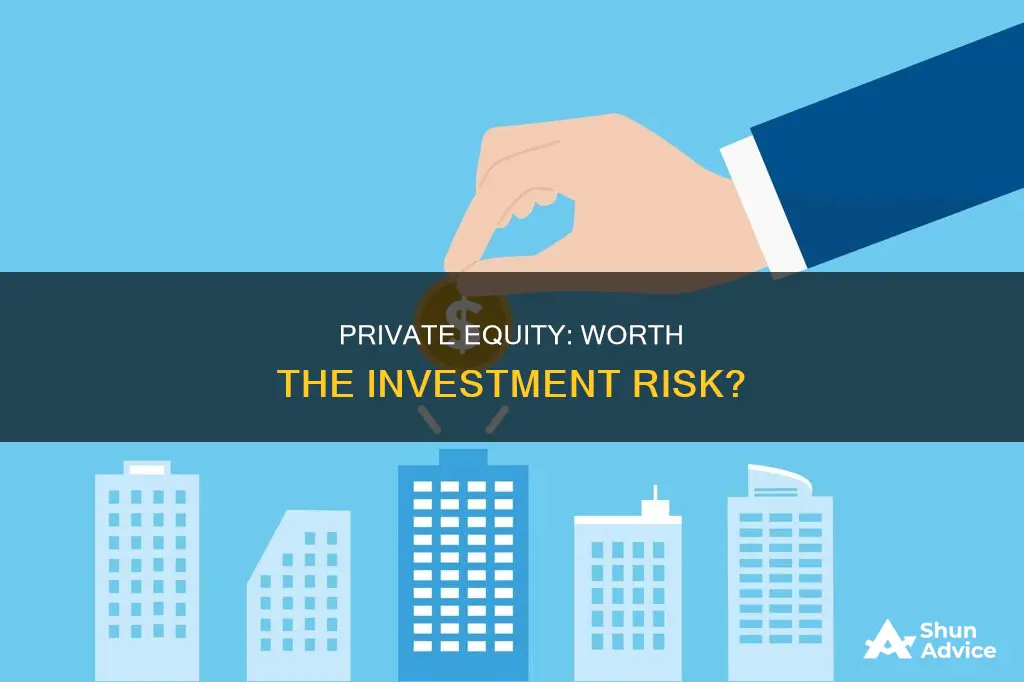
Private equity is a form of investment that takes place outside of the public stock market, allowing investors to gain an ownership stake in private companies. It is an attractive option for high-net-worth individuals and institutional investors due to its potential for high returns. However, it requires a substantial amount of capital to invest in private equity, and it is not easily accessible for the average investor. Private equity investing can be very risky and speculative, with no guarantee of success for the companies invested in. It also tends to be illiquid, with investments typically needing to be held for at least ten years. Nevertheless, private equity has historically generated greater returns than public equities, making it an option worth considering for those looking to diversify their portfolios.
| Characteristics | Values |
|---|---|
| Returns | Private equity has historically outperformed other investments, generating greater returns than public equities. |
| Risk | Private equity is a very risky investment, with no guarantee that companies will succeed and few protections for investors if they fail. |
| Accessibility | Private equity is not easily accessible for the average investor due to high minimum investment requirements. |
| Liquidity | Private equity investments are illiquid, with investors needing to hold their investment for at least 10 years. |
| Volatility | Private equity has lower volatility than public equities and has historically outperformed during market downturns. |
| Diversification | Private equity provides access to a wide range of investment opportunities and can be used to diversify traditional stock and bond portfolios. |
| Control | Private equity investors have more control over the companies they invest in, allowing them to add value through management changes, new products or services, and strategic mergers and acquisitions. |
What You'll Learn

Private equity can offer higher returns than public markets
Private equity is an attractive investment option for high-net-worth individuals and institutional investors due to its potential for higher returns than public markets. Private equity firms encourage investment from wealthy sources by promising a greater return on investment (ROI) than other alternative asset classes or more conventional investment options.
Private equity investments have consistently outperformed public markets, even during challenging economic times. During the 2008 global financial crisis, private market deals generated an internal rate of return (IRR) of 61%, compared to the S&P 500's return of -38% over the same period. This illustrates how private equity investments can weather economic downturns better than public market investments.
Historically, private equity has delivered strong returns over the long term, even though investors may not see returns on their money until the investment exits. The National Bureau of Economic Research (NBER) found that every dollar invested in private equity yielded a 20% higher return than every dollar invested in the S&P 500. Private equity buyout funds have consistently outperformed public markets since the 1980s, making it a high-return investment option for long-term investors.
From 2000 to 2020, private equity returns averaged 10.48% annually, according to the U.S. Private Equity Index by Cambridge Associates. In comparison, the Russell 2000 Index reported average returns of 6.69%, and the S&P 500 Index averaged 5.91% over the same period. A study by the CAIA also showed that state pensions' private equity allocations delivered an 11% return over 21 years, compared to 6.9% in public markets over the same period.
The higher returns in private equity are due to several factors. Private equity firms have more control over the companies they invest in, allowing them to add value beyond public equity returns. They can upgrade management, introduce new products or services, enter new markets, rationalize costs, or engage in strategic mergers and acquisitions. Additionally, private equity firms are not subject to the same pressures as public companies, such as publicly reporting quarterly results or being affected by short-term market fluctuations. This allows them to take a patient approach and realize multiple value creation initiatives, resulting in higher revenue, margins, and exit valuations.
However, it is important to note that private equity investing is not easily accessible to the average investor due to high minimum investment requirements and the need for a long-term commitment. It also carries a higher degree of risk and requires substantial illiquidity.
Best Equity Funds: Where to Invest Smartly
You may want to see also

Private equity is a long-term investment
Private equity is often a long-term investment because it involves acquiring controlling stakes in privately held companies, improving them, and then selling them for a profit. This process can take several years, as private equity firms may need to implement changes such as upgrading management, introducing new products or services, entering new markets, or engaging in strategic mergers and acquisitions.
Additionally, private equity firms are not subject to the same pressures as publicly traded companies to report quarterly results, allowing them to take a patient, long-term approach to value creation. This long-term focus also enables private equity firms to realise multiple value creation initiatives, resulting in a significantly improved company by the time it is sold.
Furthermore, private equity investments tend to be illiquid, which means that investors are typically committed for a multi-year period. This illiquidity can be beneficial as it can prevent panic selling when markets are volatile and encourages a patient, long-term investment mindset.
Overall, private equity is a long-term investment strategy due to the nature of the investment process, the ability to create value over time, and the illiquid nature of the investments.
The G Fund: Where Your Money Goes
You may want to see also

Private equity is illiquid
Private equity is an attractive investment option for high-net-worth individuals and institutional investors due to its potential for high returns. However, it is essential to understand that private equity is illiquid by nature. This illiquidity is a feature that brings both benefits and challenges.
Private equity refers to stock or ownership in a private company that is not publicly traded on an exchange. It is typically offered to specialized investment funds and limited partnerships that actively participate in managing and structuring the companies they invest in. Private equity funds are raised by investment managers who pursue specific investment strategies, such as leveraged buyouts, venture capital investments, or growth capital. These funds are then used to acquire equity ownership stakes in target companies, often involving significant amounts of debt financing.
The illiquid nature of private equity means that investments are typically long-term commitments, usually spanning multiple years. Investors should be prepared to hold their investments for at least a decade. This illiquidity is intentional and serves a crucial purpose. It allows private equity firms to focus on implementing value-creation strategies, such as management changes, cost reductions, or strategic acquisitions, without the pressure of short-term market fluctuations or the need to report quarterly results. This patient approach enables the realization of multiple value creation initiatives, resulting in higher revenue, margins, and exit valuations.
While the illiquidity of private equity can be advantageous, it also poses challenges. Investors need to carefully consider their ability to commit substantial capital for extended periods. The long-term nature of private equity investments means that funds are often tied up for years, limiting accessibility and flexibility. Additionally, the secondary market for private equity investments is also relatively illiquid. If investors need to exit their commitments early, they may have to sell their investments at a discount, incurring losses.
Furthermore, the lack of liquidity in private equity can make it challenging for investors to diversify their portfolios. It requires careful planning and a long-term perspective to balance the illiquid nature of private equity with the need for diversification across different strategies, geographies, and vintages.
In conclusion, private equity's illiquidity is a defining characteristic that sets it apart from other investment options. It allows for a patient, long-term approach to value creation but also demands a careful assessment of an investor's ability to commit capital for extended periods.
Covered Funds: A Smart Investment Strategy?
You may want to see also

Private equity is high-risk
Private equity is a high-risk investment option. It is a managed pool of raised or borrowed funds used to obtain equity ownership in smaller companies with growth potential. Private equity firms encourage investment from wealthy sources by promising a greater return on investment (ROI) than other alternative asset classes or more conventional investment options.
Private equity is a high-risk option because of the nature of the target companies, which are predominantly early-stage ventures or distressed businesses in need of restructuring. Private equity firms invest in early-stage, high-risk ventures, usually in sectors such as software and healthcare. They are also illiquid investments, with investors locked-in for between five and ten years or more, unable to redeem their capital during that period. This makes it difficult to estimate when the investment can be realised and at what valuation.
There are several other key risks to private equity investing. Operational risk refers to the potential loss resulting from inadequate processes and systems supporting the organisation. Funding risk refers to the risk that investors are unable to provide their capital commitments. Capital risk refers to the possibility of a realised loss of the original capital at the end of a fund's life. Market risk refers to the impact of the market prices of publicly listed equities at the time of sale of a portfolio company on the realisation value.
Overall, private equity is a high-risk, illiquid investment option that may result in partial or total loss of capital. It is a complex, speculative investment vehicle suitable only for qualified investors who understand the risks involved.
Fidelity Investments: TIN Number Explained
You may want to see also

Private equity is opaque
Private equity is a capital investment option for high-net-worth individuals and institutional investors. It involves investing in private companies or other investors, often in the form of a fund that takes controlling stakes in privately held companies, with the goal of improving and selling them for a profit. While private equity can offer potentially high returns, it is also associated with a high degree of risk and illiquidity.
One of the main challenges of private equity is its opacity or lack of transparency. This refers to the difficulty in obtaining accurate and comprehensive information about the companies being invested in, as well as the fees, risks, and performance of the investment. Without true transparency, it is challenging for investors to make fully informed decisions and accurately compare private equity with other investment options.
Researchers and investors have called for private equity firms to increase data sharing and transparency. They argue that the current lack of transparency makes it difficult for investors to truly understand the risks, fees, and performance of their investments. In response, some firms have started to use technology and data science techniques to improve data reporting and provide a more accurate picture of investment opportunities.
The limited transparency in private equity can also make it challenging for investors to measure and compare the returns of different funds accurately. Additionally, the performance of private equity funds is often measured using internal rates of return (IRR), which can be heavily influenced by early returns and may not accurately reflect the current performance of the fund. This makes it difficult for investors to assess the true investment risk and compare different investment options.
Furthermore, private equity firms may have structural issues that hinder transparency, such as risk misalignment and ambiguous fee reporting. These issues can make it challenging for investors to access the information they need to properly appraise the fund's performance and the manager's capabilities. As a result, investors may be taking on more risk than they realize and may not be making fully informed investment decisions.
Best S&P Index Funds: Top Picks for Your Portfolio
You may want to see also
Frequently asked questions
Private equity is a form of investment that takes place outside of the public stock market. It allows investors to gain an ownership stake in private companies.
Private equity has the potential for high returns and has historically outperformed broad public stock indexes. It can also help investors diversify their portfolios and reduce risk.
Private equity investing is very risky and illiquid. It is not easily accessible for the average investor due to high minimum investment requirements, often $25 million. There is also a lack of transparency and regulation, and the costs can be high.
There are a few ways to invest in private equity, including through mutual funds, exchange-traded funds (ETFs), and crowdfunding. However, most private equity investing is reserved for institutional investors or high-net-worth individuals.







